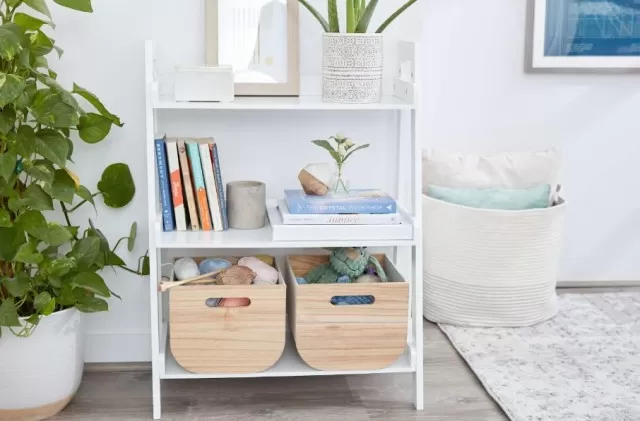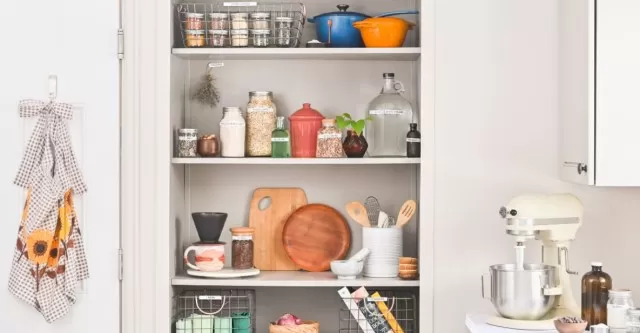To organize our living spaces can have a positive impact on our productivity and overall well-being.

By embracing minimalism and implementing effective systems, daily tasks become simpler and more efficient.
Moreover, an organized environment promotes a sense of calmness, which is especially valuable considering the increased time we spend at home.
However, it’s crucial to approach decluttering with environmental consciousness.
Thoughtless disposal of recyclable items contributes to landfill waste, and the use of plastic containers exacerbates the global warming crisis. Fortunately, the good news is that sustainable home organizing is not only achievable but also increasingly accessible.
If you prioritize an eco-friendly organization, rest assured that it’s within reach.
With careful planning and consideration, you can create a well-organized home while also making a positive impact on the environment.
Tips to Organize Home for Less Waste & Clutter

Embrace intentional decluttering.
The first step towards achieving an organized home is to purposefully let go of items that no longer serve a purpose in your life.
Whether it’s clothing, kitchen appliances, books, or furniture, consider donating them if they are still in good condition. However, it’s important to check with local charities or donation centers to ensure they can accept the specific items you want to donate.
Another option is to give away these items to family, friends, or neighbors, or even organize a garage sale to contribute to your community.
Explore recycling options.
Some items may not be suitable for donation, but that doesn’t mean they should end up in the trash.
Research recycling opportunities in your area to properly dispose of items that can be recycled instead. Websites like Earth911 provide valuable information on how to recycle various items, ranging from lightbulbs to cleaning products, and can help you locate local recycling facilities.
Opt for sustainable organizing products.
When it comes to purchasing storage containers and baskets for organizing your belongings, choose products made from recycled or renewable materials.
Increasingly, companies are producing organizing products using sustainable materials such as bamboo, cotton, and water hyacinth.
Kerry Keihn of Earth Equity Advisors emphasizes the importance of durability in sustainable products, stating, “A Key feature of sustainable products is that they are built to last.
This not only benefits the environment by reducing waste and the need for constantly replacing products, but it also provides efficiency for consumers. “.

Sustainable organizing products tend to be of higher quality and more durable than their thin plastic counterparts.
This means they require less frequent replacement, saving you time, and money, and reducing waste in the long run.
However, it’s essential to ensure that the products you choose are certified.
Keihn advises, “Not all certifications using terms like ‘green’ or ‘sustainable’ guarantee eco-friendliness. Research the certification to ensure that the product aligns with your values.”
Repurpose existing items.
Instead of purchasing new containers for organizing your closets, drawers, or desk, get creative and repurpose items you already have at home.
Shoe and jewelry boxes can serve as sturdy organizers within dresser drawers, and glass jars can be used to hold pens, dry pantry goods, or makeup brushes. Think outside the box and find innovative storage solutions that don’t require buying new items or straining your budget.
Practice intentional shopping.
Once you have decluttered, adopt a mindful approach to shopping and carefully consider what you bring into your home.
Impulse buying not only leads to clutter but also has negative environmental consequences, such as excessive packaging, particularly when shopping online.
If you buy items in bulk, consider decanting them into reusable containers to have a clear vision of your inventory.
This not only makes it easier to find what you need but also prevents overbuying and wasting goods that may expire over time, such as food or medicine. Airtight glass jars with bamboo lids can be used to store pantry staples like oats, pasta, or rice, with expiration dates or cooking instructions easily marked using a dry-erase marker.
This ensures that you can see at a glance how much you have before making additional purchases.
Embrace a paperless approach.
When considering environmental concerns, it’s important to address not only plastic but also paper waste.
Paper clutter can accumulate in your home and contribute to deforestation. While recycling paper is beneficial, it’s even better to minimize its consumption.
Take steps to remove yourself from junk mail lists and opt for paperless billing and correspondence whenever possible. Setting up a designated email account for receipts can help you stay organized during tax time and prevent paper piles on countertops or in your bag.
*The information is for reference only.